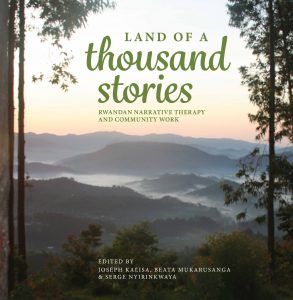Working with groups, building communities and raising heads above the clouds
This chapter includes uplifting stories of narrative community work projects from Uganda, Rwanda and South Africa. It begins with the work of Caleb Wakhungu and the Mt Elgon Self-Help Community Project which has inspired practitioners in many different contexts in the ways that it combines narrative practice with social-economic and environmental projects.
We have included here a keynote video presentation from Caleb Wakhungu:
A facilitation guide: The power of hope in action: Raising Our Heads Above the Clouds.
And an earlier publication which tells the story of this work in some detail.
Raising our heads above the clouds: The use of narrative practices to motivate social action and economic projects – The work of Caleb Wakhungu and the Mt Elgon Self-Help Community
Likono mu Lumasaba (audio in Lumasaba)
Wandikha’ano byesi wambasya khulikono lyesi uwulile oba sifani syesi oboone.
To leave a comment about this video/audio, click here.
Working with groups of women
A number of practitioners have developed ways of working with women in groups. This includes Colette Kayisengerwa from Rwanda who has been using narrative practices to collect stories, skills and knowledge of women whose husbands have died. This project includes a list of narrative-informed questions for women to reflect on their experiences of grief and loss, and a heartfelt response to these by Rwandan women. Here is a video of Collette presenting in English, followed by an audio clip in Kinyarwandan.
Inkuru y’amajwi mu Kinyarwanda (audio in Kinyarwanda)
Ushaka gutanga ibitekerezo kuri iyi nkuru y’amashusho/y’amajwi, kanda hano.
To leave a comment about this video/audio, click here.
Ncazelo Ncube-Mlilo in South Africa has also developed forms of narrative practice with groups of women facing many hardships and injustices. In the following video she describes her COURRAGE Methodology:
Ncazelo and her organisation Phola are also involved in projects seeking to prevent men’s violence. In the following video she describes the OUTRAGED methodology:
Collective responses to mental health stigma
We close this chapter in relation to collective responses to mental health stigma. OPROMAMER is an organisation of former psychiatric patients in Rwanda founded by Claver Haragirimana and Veneranda Ufitwenaryo.
We have included here an interview and audio note with Claver Haragirimana; a paper and audio note by Joseph Kalisa describing his narrative practice collaborations with OPROMAMER and a video of theatrical honouring of OPROMAMER’s work that took place at the International Conference in Kigali.
These interviews were published in Land of a Thousand Stories: Rwandan narrative therapy and community work — edited by Joseph Kalisa, Beata Mukarusanga and Serge Nyirinkwaya
Solidarity and friendship: An interview with Claver Haragirimana
Claver Haragirima is one of the founders of OPROMAMER, a influential peer mental health organisation in Rwanda. In this interview, Claver speaks of the history of the organisation and the significance of solidarity and friendship.
You can read the interview here. Or listen to the Kinyarwandan audio below:
Inkuru y’amajwi mu Kinyarwanda (audio in Kinyarwanda)
Collective responses to mental health stigma: Sharing lived wisdom by Joseph Kalisa
Collective responses are required when collective communities face significant hardships. In this paper, Joseph Kalisa describes his collaborations with OPROMAMER and ways in which lived wisdom is shared between members.
You can read the interview here. Or listen to the Kinyarwandan audio below:
Inkuru y’amajwi mu Kinyarwanda (audio in Kinyarwanda)
OPROMAMER versus STIGMA: Honouring OPROMAMER through the metaphor of football
During the conference in Rwanda a keynote address told the story of OPROMAMER and its extraordinary achievements through the metaphor of a football match, with commentary in Kinyarwandan and English. The OPROMAMER team were up against a Brazilian team representing STIGMA. This is an adaptation of the Team of Life approach.
